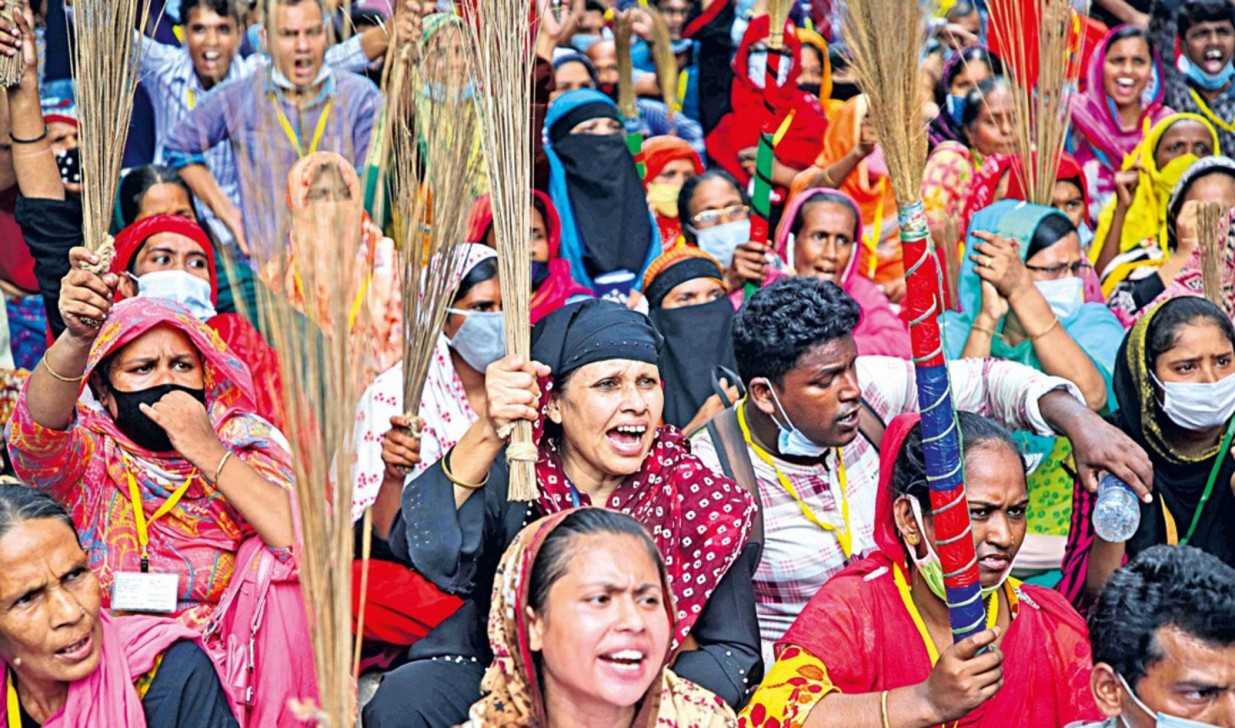Ways of address Covid-19 induced labour market challenges

Collected
Covid-19 deeply affected the labour market in Bangladesh. It intensified some of the existing challenges and caused a new group of problems. A large number of individuals either lost employment or income and several are also experiencing powerful job insecurity and uncertainty.The labour market was facing several challenges even before Covid-19. Though the Bangladesh economy has undergone significant structural changes over the last five decades, agriculture still holds the largest share of total employment. Despite high monetary growth, there's been slow growth in job creation recently. With the changing nature of manufacturing and services sectors-leaning towards automation-job creation in these sectors remains a large challenge. Furthermore, the share of informal employment altogether employment in Bangladesh remains well above 85 percent, which can be an immense challenge to making significant headway in ensuring decent jobs.For all latest news, follow The Daily Star's Google News channel.It really is noteworthy that, in the last decade, the labour force participation (LFP) rate of females has remained stagnant at around 35 percent. Also, though the country is passing through the phase of the demographic dividend, the share of youth "not in education, economic activities and training (NEET)" is high, and the youth unemployment rate is excessive. You will find a vicious cycle of low-wage, low-skill and low productivity in the labour market. As the enhancement of labour productivity critically depends upon both quality health and education services, Bangladesh lags drastically in ensuring quality health insurance and education for all. The public expenditures on health and education as percentages of GDP in Bangladesh are incredibly low, which deter boosting labour productivity.Other salient employment challenges include persistence of poor working condition, a high amount of rural-urban migration with an enormous concentration of migrated labour in the urban informal services sectors, skill mismatch in the labour market, and the outward migration of a high concentration of low-skilled labour.There is no denying that the labour market and employment challenges are closely from the acceleration and sustenance of economical growth, enhancing the standard of economic growth and monetary diversification. Though the country experienced robust economical growth during the last decade, there's not been substantial monetary diversification. However, financial diversification is probably the most critical facets for job creation and provision of quality employment. The failure of a required and productive financial diversification has persisted in a number of labour market challenges in Bangladesh. Even though the private sector plays the most pivotal role in job creation, the private sector's investment-to-GDP ratio has remained stagnant during the last decade. Energising private sector investment thus remains a precondition for addressing many labour market challenges, as discussed above.The levels and magnitudes of uncertainty brought by Covid-19 in the labour market are enormous. Covid-19 has also led to high adjustment costs both at family members and firm levels. In pre-pandemic time, with the mobility of labour, job losses in one sector were compensated by job gains in other sectors; for instance, either through the movements from agriculture to industry and services or through movements within the sub-sectors of agriculture, industry and services. But, through the pandemic, options for such adjustments and relocation of labour are limited and uncertain.There are grave future implications of the current labour market challenges. The recovery in the labour market is dependent on the recovery of the overall economy. However, the economic recovery process has remained slow and disrupted. The economic recovery can be happening at the price tag on inter-generational trade-off with high adjustment costs. The pandemic forced many people, with uncertain prospects of jobs and earnings, to stress on their current survival instead of on their human capital development for future years. Also, when schools and universities have remained closed for months, you will find a risky that students from distressed families will have no choice but out of the education system permanently. Moreover, as the micro, small and medium enterprises (MSMEs) will be the prime victims of the pandemic, their recoveries have remained highly uncertain. Many self-employed in the MSMEs perhaps permanently lost their capital. Also, wage employment is suffering as monetary activities are yet to recuperate.All this may raise the existing high degrees of youth unemployment and youth NEET. As shreds of evidence are unfolding, females will be afflicted than their male counterparts.So, what ought to be done?First, acknowledging and understanding the labour market challenges is a precondition to taking any counter-measures. The Eighth Five Year Plan and the government's other policy documents barely address the existing and Covid-19 induced labour market challenges in Bangladesh. However, you will find a need to undertake a thorough approach linking policies and programmes for monetary and social recoveries. Critical emphasis ought to be on the recovery of the MSMEs. Action plans should be developed and implemented through the relevant ministries. Second, acknowledging that the government's existing policies and programmes are inadequate to handle the Covid-19 induced labour market challenges. The government's actions linked to the existing labour market challenges have remained slow and insufficient. In particular, the new-poor, experiencing highly disrupted engagements in the labour market, aren't covered in the prevailing social back-up programmes. Therefore, the government should introduce new social back-up programmes targeting the labour market. In this context, the federal government can undertake the programmes of employment guarantee schemes for the vulnerable population.Third, the federal government should form a Labour and Employment Commission to examine the existing unprecedented situation and advise necessary measures.
Source: https://www.thedailystar.net
Tags :
Previous Story
- New digital platform to operate a vehicle growth...
- College of Agriculture alumna creates retail, bulk meat...
- Is this Minnesota county's animal unit cap killing...
- Agricultural Enterprise Fund Accepting New Applications
- Old-fashioned farming in west-central Minnesota showcases 'root of...
- Farmers would gain 'Right to Repair' tools under...
- Agribusiness not any more overwhelming nation's populace
- Farm growth propels Bangladesh’s faster economic progress